
The Judge Advocate General's Corps, also known as the "JAG Corps" or "JAG", is the legal arm of the United States Navy. Today, the corps consists of a worldwide organization of more than 730 commissioned officers serving as judge advocates, 30 limited duty officers (law), 500 enlisted members and nearly 275 civilian personnel, all serving under the direction of the Judge Advocate General of the Navy.
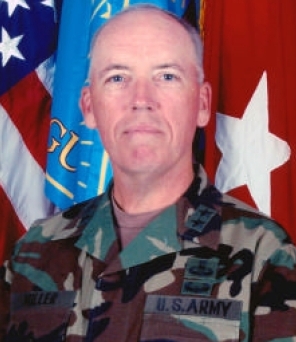
Geoffrey D. Miller is a retired United States Army major general who commanded the US detention facilities at Guantanamo Bay, Cuba, and Iraq. Detention facilities in Iraq under his command included Abu Ghraib prison, Camp Cropper, and Camp Bucca. He is noted for having trained soldiers in using torture, or "enhanced interrogation techniques" in US euphemism, and for carrying out the "First Special Interrogation Plan," signed by the Secretary of Defense, against a Guantanamo detainee.
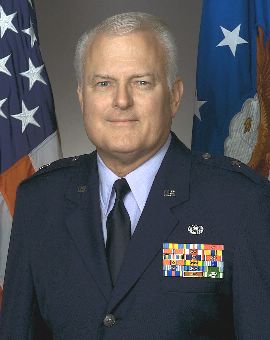
Brigadier General Thomas Hemingway is an American military lawyer who has served as a legal advisor to the Office of Military Commissions. Thomas Hemingway was a distinguished graduate of the Air Force ROTC program, was commissioned as a second lieutenant in November 1962 after earning his undergraduate degree at Willamette University. Upon graduation, he took an educational delay and earned his doctor of jurisprudence in 1965 at Willamette University College of Law. Hemingway entered active service in November 1965. He has also been an associate professor of law at the United States Air Force Academy and a senior judge on the Air Force Court of Military Review. He is a current member of the state bar in Oregon and the District of Columbia, and has been admitted to practice before the U.S. Court of Federal Claims, the U.S. Court of Appeals for the Federal Circuit and the Supreme Court of the United States. He retired from active service in October 1996. General Hemingway was recalled to active service in August 2003 to fill the position as Legal Adviser to the Convening Authority in the Department of Defense Office of Military Commissions, Washington, D.C. General. He was replaced by Thomas W. Hartmann in July 2007.

Albert Thomas Church III is a retired vice admiral in the United States Navy. Church served as on active duty for 36 years, retiring as a vice admiral in 2005. During his service he commanded two warships, the Navy's largest shore installation at Naval Station Norfolk, Virginia, and was the longest-serving budget director of the Navy (1998–2002). Church also served as the Naval Inspector General, during which time he completed a comprehensive review of interrogation techniques used by the Department of Defense in Iraq, Afghanistan, and at Guantanamo Bay, Cuba. He is currently president of Prescient Edge Corporation, a US-based national security services and technology Firm.
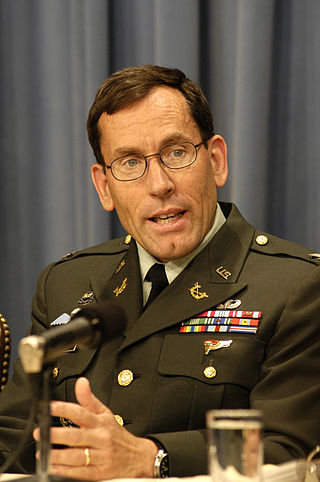
Colonel Frederic L. Borch was a career United States Army attorney with a master's degree in national security studies, who served as chief prosecutor of the Guantanamo military commissions. He resigned his commission in August 2005 after three prosecutors complained that he had rigged the system against providing due process to defendants. He was replaced by Robert L. Swann

Alberto José Mora is a former General Counsel of the Navy. He led an effort within the Defense Department to oppose the legal theories of John Yoo and to try to end the use of torture at Guantanamo Bay.
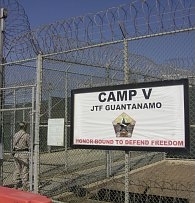
The Guantanamo Bay detention camp is a United States military prison within Naval Station Guantanamo Bay (NSGB), also called GTMO on the coast of Guantánamo Bay, Cuba. It was established in January 2002 by U.S. President George W. Bush to hold terrorism suspects and "illegal enemy combatants" during the Global War on Terrorism following the attacks of September 11, 2001. As of August 2024, at least 780 persons from 48 countries have been detained at the camp since its creation, of whom 740 had been transferred elsewhere, 9 died in custody, and 30 remain; only 16 detainees have ever been charged by the U.S. with criminal offenses.

Charles D. Swift is an American attorney and former career Navy officer, who retired in 2007 as a Lieutenant Commander in the Judge Advocate General's Corps. He is most noted for having served as defense counsel for Salim Ahmed Hamdan, a detainee from Yemen who was the first to be charged at Guantanamo Bay; Swift took his case to the US Supreme Court. In 2005 and June 2006, the National Law Journal recognized Swift as one of the top lawyers nationally because of his work on behalf of justice for the detainees.
The Criminal Investigation Task Force (CITF) is an organization created in early 2002 by the United States Department of Defense to conduct investigations of detainees captured in the War on Terrorism. It was envisioned that certain captured individuals would be tried by a military tribunal for war crimes and/or acts of terrorism.

Matthew Mark Diaz is a former active-duty Lieutenant Commander (LCDR) and Judge Advocate General's Corps (JAGC) officer in the United States Navy. In mid-to-late 2004, Diaz served a six-month tour of duty in Guantanamo Bay, Cuba as deputy director of the detention center's legal office. Early in 2005 as LCDR Diaz was concluding his tour, he sent an anonymous greeting card to The Center for Constitutional Rights, a New York civil liberties and human rights group. The card contained the names of the detainees held at the Guantanamo Bay detention camp. In July 2006, the United States government formally charged Diaz in a military court with five criminal counts related to the sending of these names, the most serious being that he intended to harm national security or advantage a foreign nation, a violation of the Espionage Act. In May 2007, he was convicted by a seven-member jury of military officers on 4 of 5 counts. He served a 6-month prison sentence and was dismissed from the military.

Susan Morrisey Livingstone was the first female Acting United States Secretary of the Navy.

William James "Jim" Haynes II is an American lawyer and was General Counsel of the Department of Defense during much of 43rd President George W. Bush's administration and his war on terror. Haynes resigned as general counsel effective March 2008.
The United States Marine Corps' Judge Advocate Division serves both to advise the Commandant of the Marine Corps (CMC) and other officials in Headquarters, Marine Corps on legal matters, and to oversee the Marine Corps legal community. The head of the Judge Advocate Division (JAD) is the Staff Judge Advocate to the Commandant.
Stuart Couch is an American lawyer, veteran, and immigration judge. Couch took a conscience driven decision to refuse to prosecute an accused man because he had been tortured by Americans to obtain evidence against him. He was played by Benedict Cumberbatch in a resulting film.

Peter M. Murphy is an American lawyer, and former senior legal advisor to the Commandant of the Marine Corps. Murphy was the Commandant's legal advisor twenty years prior to becoming a partner with the legal firm of Holland & Knight. At Holland & Knight Murphy specialized in Government litigation.
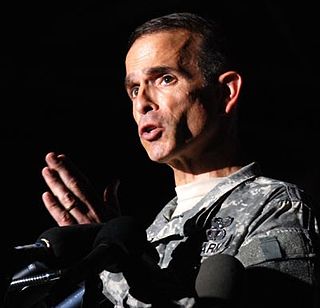
Attorney Lawrence J. Morris is the chief of staff and counselor to the president at The Catholic University of America and a retired United States Army colonel.
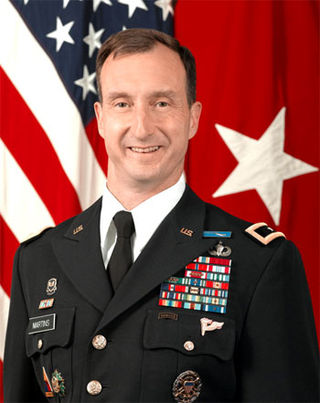
Mark Steven Martins is a retired United States Army officer. He attained the rank of brigadier general in the United States Army Judge Advocate General's Corps. Martin's final position was Chief Prosecutor of Military Commissions, overseeing the trial of Khalid Sheik Mohammed and four co-defendants.
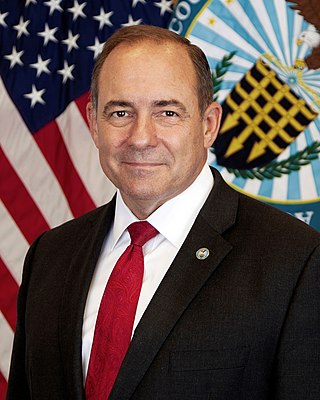
William K. Lietzau is an American lawyer, former U.S. Marine Corps judge advocate, and former director of the Defense Counterintelligence and Security Agency.

Vaughn A. Ary is a retired American major general and the former staff judge advocate to the Commandant of the Marine Corps and director of the United States Marine Corps Judge Advocate Division. Ary was forced to retire from his role of Conventing Authority for Military Trials of Guantanamo Bay detention camp, by a U.S. Federal judge, after five months. Ary currently serves as U.S. Department of Justice as Director of the Office of International Affairs, where he has responsibility for U.S.-initiated extraditions and U.S.-requested deportations.

Donald Joseph Guter is an American educator, lawyer and retired United States Navy rear admiral who was the 10th president and dean of South Texas College of Law Houston from 2009 to 2019. He previously served as the 10th dean of the Duquesne University School of Law from 2005 to 2008, when he was dismissed by Duquesne University president Charles J. Dougherty over a tenure battle.















